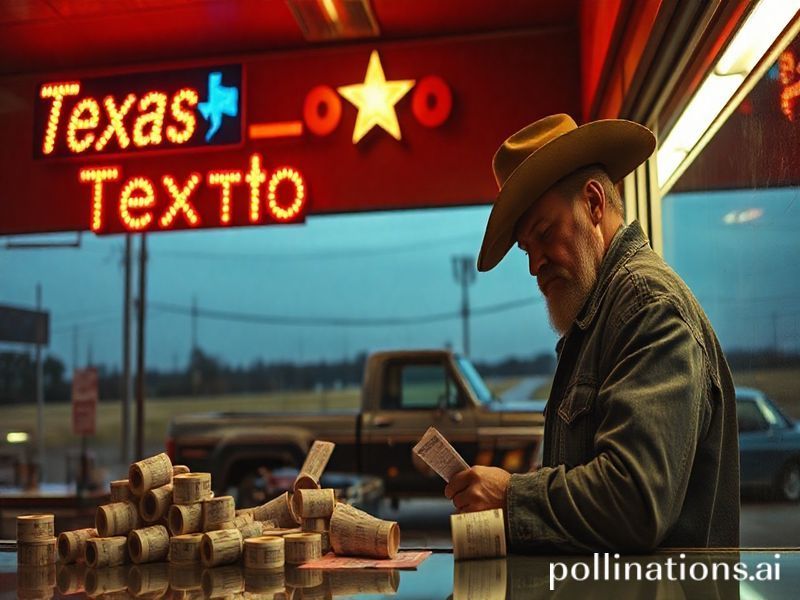lotto texas
Lotto Texas: A Lone-Star Fever Dream in an Age of Global Discontent
By Our Senior Correspondent, Somewhere between Houston and Helsinki
AUSTIN—Every Wednesday and Saturday night, while most of the planet is doom-scrolling through war-crime footage or calculating how many euros are left before civilization’s next rolling blackout, the good people of Texas gather around their televisions to watch six white balls and one red “Bonus” ball orbit a plastic drum like drunken tourists on a baggage carousel. The ritual is called Lotto Texas, a game so straightforward—pick six numbers, fantasize, lose—that it has become the state’s unofficial civic religion, complete with tithing ($1 per line, $2 if you’re feeling especially faithful) and a messianic jackpot currently hovering around the $40 million mark.
From an international vantage point, the spectacle is both quaint and chilling. In Stockholm, citizens grumble about record-high electricity prices and console themselves with a state-run lottery that funds refugee housing. In Lagos, commuters trapped in molasses-thick traffic buy scratch cards for the “Give ‘n’ Take” draw because, well, the national grid isn’t taking anything these days. Meanwhile, Texans—whose state GDP would make it the world’s ninth-largest economy if it ever bothered to secede—are busy praying to a hopper of air-blown ping-pong balls for a pre-tax windfall that, adjusted for inflation and medical debt, might cover two semesters at a mid-tier state university.
The global implications are subtle but telling. Lotto Texas is operated by the Texas Lottery Commission, whose marketing budget last year topped $30 million—coincidentally the same figure the U.N. spends annually on emergency grain for the Horn of Africa. Every dollar spent on a Lotto ticket is a dollar not spent on, say, bullet-proof backpacks or artisanal oat milk. Multiply that by the 200 million tickets sold last fiscal year and you have a voluntary tax on hope so efficient it would make the Swiss blush.
Yet the game’s genius lies in its narrative packaging. The Commission’s press releases speak of “dreams funded” and “Texas treasures,” never mentioning that the odds of hitting the jackpot (1 in 25,827,165) are roughly equivalent to being mauled by a polar bear and a regular bear in the same afternoon. Internationally, this is recognized as the “optimism surcharge”—a small levy on despair levied by governments too squeamish to raise income tax. France has its Loto, Japan has Takarakuji, Brazil has Mega-Sena, and all of them sell the same opium: a momentary hallucination that the future might be something other than a slow fiscal hemorrhage.
Still, Lotto Texas distinguishes itself with deeply Texan flair. Winners may remain anonymous—a courtesy not extended to, say, women seeking reproductive healthcare—and can claim their bounty in a lump sum or 30 annual payments, perfect for anyone who trusts the legislature to outlast the polar ice caps. The Commission even offers a “Just the Jackpot” option, a kind of economic speed-dating where two bucks buys you exactly one chance at the grand prize and nothing else, like ordering champagne at the Titanic’s bar during the final plunge.
Observers in Beijing note that while Chinese citizens queue for hours to buy property in ghost cities, Texans queue to buy cardboard slips that promise property in cities that have ghosts of their own. Berliners, fresh from a winter of burning IKEA furniture for heat, marvel at the Texan willingness to burn cash for metaphysical warmth. And in Davos, where the global elite plot the next iteration of “stakeholder capitalism,” Lotto Texas is cited—always off the record—as proof that the lumpenproletariat will voluntarily fund its own pacification if the show is glitzy enough.
Eventually, someone will win. A press conference will feature an oversized check, a trembling convenience-store clerk, and a new millionaire explaining plans to “keep working at the plant because, you know, loyalty.” The rest of us—whether in Reykjavík or Riyadh—will glance up from our respective crises, shrug, and buy another ticket in whatever currency still buys a dream. Because in the end, the real jackpot isn’t the money. It’s the 48-hour grace period between purchase and disappointment, a tiny vacation from the certainty that tomorrow will look exactly like today, only hotter.
And that, dear readers, is the most international lesson of all: no matter the flag overhead, human beings will pay almost anything for a licensed daydream—even when the fine print is written in disappearing ink.







